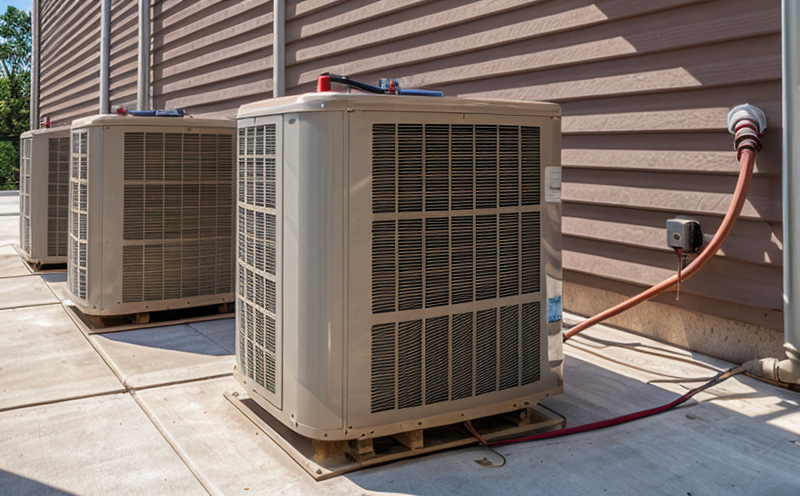ISO 7730-2005 Thermal Comfort Assessment
In today’s built environment, maintaining a balance between occupant comfort and energy efficiency is crucial. The ISO 7730 standard provides guidelines for assessing thermal comfort in indoor spaces. This service focuses on the application of ISO 7730-2005 to evaluate HVAC systems within commercial buildings. Thermal comfort assessment ensures that occupants can perform their tasks effectively without discomfort, which directly impacts productivity and satisfaction.
The standard is designed to provide a framework for measuring thermal conditions in indoor spaces using subjective ratings. It defines the parameters of thermal neutrality zone (TNZ), which indicates when an individual perceives themselves as being neither hot nor cold. The assessment process involves several key steps:
- Environmental Parameters Measurement: This includes temperature, humidity, air velocity, and radiant temperature.
- Subjective Assessment: Occupants are surveyed using the PMV (Predicted Mean Vote) method to quantify their thermal sensations. This helps in determining whether they feel comfortable or experience discomfort.
- Analytical Modeling: Using computational fluid dynamics (CFD), detailed analyses of airflow and heat transfer within the space can be conducted to identify areas where adjustments are needed.
The service we offer ensures that your HVAC systems meet these stringent requirements. Our team uses advanced tools like thermocouples, anemometers, hygrometers, and CFD software to gather accurate data. Compliance with ISO 7730-2005 not only enhances the user experience but also aids in reducing energy consumption by optimizing system performance.
Our approach ensures that your facilities are not only compliant with international standards but also aligned with modern sustainability goals. By addressing thermal comfort early in the design and operation phases, we help you achieve long-term benefits such as enhanced occupant health, reduced operational costs, and improved environmental impact.
In summary, ISO 7730-2005 is a vital tool for any organization looking to optimize HVAC systems. Our service provides comprehensive assessments that ensure compliance with this standard while enhancing the overall quality of the built environment. This not only supports regulatory requirements but also contributes significantly to creating comfortable and efficient spaces.
By partnering with Eurolab, you gain access to expert knowledge and state-of-the-art facilities dedicated to providing accurate thermal comfort assessments. Our commitment is to ensure that your HVAC systems are optimized for both comfort and efficiency, leading to satisfied occupants and a sustainable future.
Applied Standards
The ISO 7730-2005 standard has been widely adopted globally due to its comprehensive approach to thermal comfort evaluation. It is particularly relevant for commercial buildings where HVAC systems play a critical role in maintaining indoor air quality and occupant satisfaction.
Key aspects of the standard include:
- PMV Methodology: This method evaluates thermal comfort based on temperature, humidity, and air velocity. It provides a numerical score that indicates whether occupants are likely to be satisfied with the thermal environment.
- Radiant Temperature Assessment: The standard also considers radiant heat transfer, which can significantly affect perceived thermal conditions. This aspect is crucial in spaces where direct sunlight or artificial heating sources may cause localized discomfort.
The ISO 7730-2005 framework ensures that all relevant parameters are considered when assessing thermal comfort. By adhering to these standards, we ensure that your HVAC systems meet the highest quality benchmarks in terms of comfort and efficiency.
Scope and Methodology
The scope of our ISO 7730-2005 thermal comfort assessment service extends across various aspects of building and infrastructure testing. Our methodology ensures that every component contributing to the indoor environment is evaluated comprehensively.
We start by gathering baseline data on environmental parameters such as temperature, humidity, and air velocity. This information forms the foundation for our analysis. Subsequently, we conduct subjective assessments through surveys using the PMV method. These surveys provide invaluable insights into how occupants perceive their thermal environment.
Our methodology also includes detailed CFD modeling to simulate airflow patterns and heat distribution within your space. This allows us to identify potential areas of improvement in real-time simulations before implementing any changes. Our goal is not only compliance with ISO 7730-2005 but also optimization for enhanced performance.
In summary, our scope encompasses a holistic approach that considers both objective and subjective factors influencing thermal comfort. By leveraging cutting-edge technology and expert knowledge, we ensure that your HVAC systems are finely tuned to deliver optimal results.
Eurolab Advantages
EuroLab offers unparalleled expertise in ISO 7730-2005 thermal comfort assessment. Our advantages include:
- Comprehensive Expertise: Our team comprises professionals with extensive experience in building and infrastructure testing, ensuring that our assessments are thorough and accurate.
- Advanced Technology: We utilize the latest instrumentation and software to gather precise data on environmental parameters. This ensures reliable results that can be trusted for decision-making purposes.
- Customized Solutions: Every project receives tailored solutions based on specific requirements and unique challenges faced by your organization.
- Prompt Reporting: Timely delivery of comprehensive reports allows you to quickly implement necessary changes, ensuring continuous improvement in thermal comfort.
- Regulatory Compliance: By adhering strictly to ISO 7730-2005 standards, we ensure that your HVAC systems are compliant with international regulations. This reduces the risk of non-compliance penalties and enhances your reputation as a responsible corporate citizen.
Our commitment is to provide you with the highest level of service, ensuring that your facilities are not only compliant but also optimized for maximum efficiency and occupant satisfaction.





